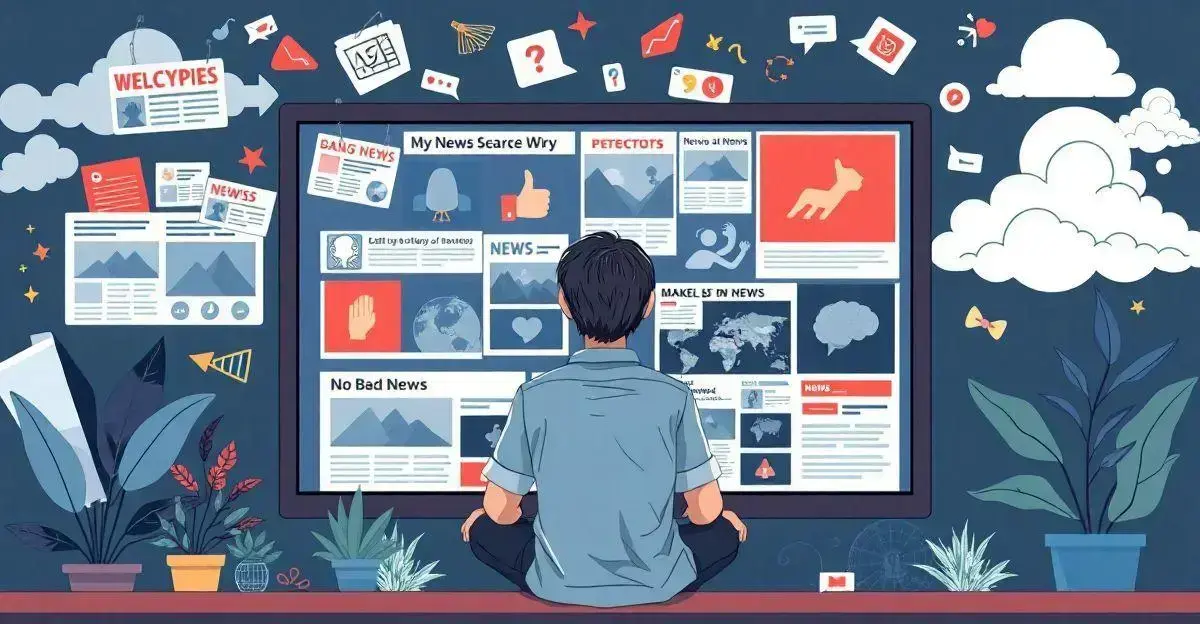The impact of news on society is profound, influencing public perception, shaping cultural norms, and affecting daily decisions.
As news outlets evolve, understanding its implications becomes essential for individuals and communities.
The Role of News in Shaping Public Opinion
The role of news in shaping public opinion is crucial. News informs the public, offering insights into current events, local affairs, and global issues. Public opinion can often be influenced by the way news stories are presented. For instance, the choice of words, images, and even the time of publication can affect how viewers perceive a situation.
Moreover, news can act as a powerful tool for social change. When stories highlight important issues, they can mobilise communities, prompting action and advocacy. For instance, coverage of environmental issues can lead to greater awareness and initiatives for sustainability.
Furthermore, the accessibility of news through various platforms, such as social media, has transformed how individuals engage with information. People can now participate in discussions, share their perspectives, and become more informed citizens. This accessibility fosters a dynamic dialogue in society.
However, it’s important to critically assess news sources. Not all news is created equal; this means distinguishing between credible sources and misleading or biased content is critical. As consumers of news, individuals must be discerning, ensuring they rely on authentic reporting to form their opinions.
How News Affects Social Change

News plays a vital role in how social change occurs within a community. By raising awareness of critical issues, news can ignite public discourse and inspire collective action. For example, coverage of social injustices often leads to protests, advocacy groups, and policy changes.
Additionally, news reports are essential for highlighting success stories in communities, showcasing how grassroots initiatives can lead to positive change. Sharing these stories can motivate others to engage and create their own solutions to societal challenges.
Moreover, the way news is framed can significantly influence public perception. A narrative that presents a problem in a relatable way can spur people into action, encouraging them to participate in movements or support specific causes. This illustrates the power journalists hold in shaping conversations around social issues.
As consumers of news, it’s crucial to critically evaluate the information presented. Not all news serves to enlighten; sometimes, sensationalism may overshadow important topics. Individuals need to seek out trustworthy sources that strive to inform rather than mislead.
The Impact of Fake News on Society
The impact of fake news on society is a growing concern. Often, misleading information can spread quickly across social media platforms, influencing how people perceive reality. This can lead to significant consequences, such as the erosion of trust in reliable sources of news and public institutions.
Fake news often preys on emotions, connecting with people in a way that genuine reporting may not. This emotional manipulation can polarise communities, creating divisions and escalating tensions over sensitive issues.
Moreover, the rapid spread of misinformation can hinder constructive dialogue. When individuals are presented with false narratives, it becomes challenging to engage in meaningful conversations about important topics. Society suffers when discussions are based on incorrect premises.
As responsible consumers of information, it is vital to verify news before sharing it. Engaging with credible news sources and cross-referencing multiple perspectives can help combat the spread of fake news. Education is key in equipping individuals to discern between truth and falsehood in the news.
News Consumption and Mental Health

News consumption can significantly affect mental health. In today’s fast-paced world, people are constantly bombarded with news from various sources, including social media, television, and online articles. This continuous exposure can lead to information overload, which may cause stress and anxiety.
Many individuals develop a habit of checking news updates frequently. This can create a cycle of worry, especially when news stories focus on negative events. Research has shown that constant exposure to distressing news can increase feelings of helplessness and hopelessness.
Furthermore, engaging with negative news can lead to a phenomenon known as doomscrolling, where a person compulsively scrolls through negative news feeds. This behaviour can disrupt daily life and contribute to depressive symptoms.
It is essential for individuals to find a balance in their news consumption. Setting specific times to check the news rather than doing so continuously can help mitigate anxiety. Engaging with positive news stories or uplifting content can also offer a respite from the negativity often found in mainstream media.
The Influence of Social Media on News Delivery
The influence of social media on news delivery is significant, transforming how information reaches the public. Social media platforms have become primary sources for consuming news, enabling users to share and engage with stories instantly. This rapid dissemination of information has reshaped traditional news cycles.
However, the immediacy of social media often comes at the cost of accuracy. False information can spread quickly as users share news without verifying its credibility. This underscores the need for media literacy, empowering users to distinguish between reputable sources and unreliable content.
Social media also fosters echo chambers, where individuals encounter news that aligns with their beliefs. This limits exposure to diverse perspectives, reinforcing biases and potentially polarizing communities.
Additionally, social media trends significantly impact public discourse and traditional media coverage. Stories that gain traction online often receive increased attention from journalists, creating a cycle where social media heavily influences what is considered newsworthy.
The Accountability of Journalists in Society

The accountability of journalists is crucial for maintaining trust and integrity in news reporting. Their responsibility to provide accurate and fair information is fundamental to upholding democracy. Adhering to ethical standards ensures that the news remains a reliable resource for the public.
Accountability requires journalists to verify facts, source information properly, and acknowledge any mistakes made during reporting. Swift corrections of errors are essential to maintaining credibility and fostering trust with the audience.
The rise of social media has amplified scrutiny on journalists, as the public can now easily challenge inaccurate or biased reporting. This heightened visibility pushes journalists to strive for greater accuracy and excellence in their work.
Responsible journalism also plays a key role in fostering an informed citizenry. Clear, factual reporting enables individuals to engage with critical societal issues and make well-informed decisions. Journalists, therefore, hold a pivotal position in shaping public discourse and influencing policy through their work.
Comparing News Impact: Traditional vs. Digital Media
Comparing the impact of traditional and digital media highlights notable differences in how information is delivered and consumed.
Traditional media, such as newspapers and television, operates on fixed schedules, offering a structured approach to news delivery. Audiences can rely on updates at specific times, creating a sense of routine and predictability.
In contrast, digital media provides 24/7 access, allowing users to engage with news content at their convenience. This flexibility caters to modern audiences but also comes with challenges, such as the rapid spread of misinformation due to the lack of stringent editorial oversight.
Traditional media is known for its established editorial standards, with fact-checkers ensuring the accuracy of information. Meanwhile, digital platforms often prioritize speed, which can sometimes compromise these standards. The abundance of online sources further emphasizes the need for critical evaluation to distinguish credible information from unreliable content.
Additionally, traditional media tends to focus on broad topics aimed at general audiences. Digital platforms, however, offer niche content tailored to specific interests, enabling users to engage deeply with issues that matter to them. While this personalization enhances relevance, it can also lead to echo chambers, limiting exposure to diverse perspectives.
Both formats have unique strengths and weaknesses. To navigate the modern news landscape effectively, individuals must thoughtfully leverage the benefits of both traditional and digital media while critically assessing the content they consume.
The Global Perspective on News Influence

The global perspective on news influence underscores how news shapes public opinion across diverse cultures and regions. Around the world, the news serves as a vital source of information, guiding people’s understanding of local and global issues.
The impact of news varies depending on cultural contexts and media accessibility. In some countries, state-run media control the narrative, shaping citizens’ beliefs about their government and the world. This can result in significant bias, limiting the diversity of information available to the public. Conversely, in democracies, a free press plays a crucial role in holding governments accountable and providing varied perspectives.
With the rise of social media, news consumption has undergone a global transformation. People now share and comment on stories, fostering a community of engaged citizens and enabling the rapid exchange of ideas across borders. This connectivity can promote understanding and empathy among different cultures.
However, the global reach of digital media also presents challenges. Misinformation spreads quickly, making it harder for audiences to discern credible news from false narratives. Cultivating critical thinking skills is essential for consumers worldwide to navigate the complexities of modern news consumption effectively.
Future Trends in News Consumption
Future trends in news consumption are evolving rapidly, driven by technological advancements and shifting audience preferences. Mobile devices have become the primary source for news, prompting platforms to focus on delivering quick, digestible content. To meet this demand, news organisations are adapting by presenting stories in shareable formats, particularly tailored for social media.
The rise of video content is another transformative trend. Platforms like YouTube and TikTok enable news outlets to connect with younger audiences through dynamic and visually engaging storytelling. Visual reports often capture attention more effectively than written articles, making them an essential tool for modern news dissemination.
Podcasts are also growing in popularity as a medium for consuming news. Their convenience, particularly for listeners who are commuting, exercising, or multitasking, allows for deeper discussions and nuanced perspectives. This format helps audiences better understand complex issues while fitting seamlessly into busy lifestyles.
Personalised content is reshaping how individuals engage with news. Using algorithms, news outlets can tailor stories to match user interests, creating a more relevant and engaging browsing experience. However, this trend must be managed carefully to ensure diverse news consumption and avoid the pitfalls of echo chambers.
For news organisations to remain relevant, adapting to these trends is essential. By embracing new technologies and formats, they can connect more effectively with audiences and continue to play a vital role in the evolving media landscape.
FAQ – Frequently Asked Questions About the Impact of News on Society
How does news consumption impact mental health?
Excessive news consumption, especially negative news, can lead to anxiety and stress. It’s important to manage how much news you engage with.
What role does social media play in news delivery?
Social media allows news to spread quickly and provides users with multiple perspectives, but it can also facilitate the spread of misinformation.
Why is the accountability of journalists important?
Accountability ensures that journalists report accurately and ethically, which helps build public trust in the news media.
What are the differences between traditional and digital media?
Traditional media has a fixed schedule for news delivery, while digital media offers 24/7 accessibility and diverse content formats.
How can I evaluate the credibility of news sources?
Look for reputable publications, check for citations, and compare stories across multiple sources to verify information.
What future trends should we expect in news consumption?
Expect increased use of mobile devices, video content, podcasts, and more personalised news feeds as technology evolves.
